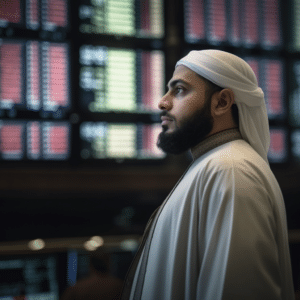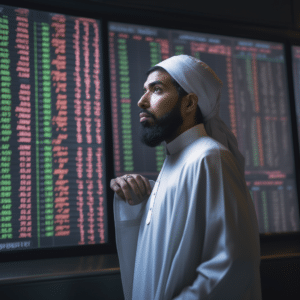In recent years, the best Sukuk bonds have received a great deal of interest in the international bond market. Know the 5 best Sukuk bonds in this article.
Investment products like Sukuk have flourished as a result of the Islamic finance industry’s meteoric ascent to prominence.
This market is expected to develop by as much as 25% annually to reach US$2.2 billion in assets under management (AUM).
The term sukuk comes from the Arabic word sakk, which may be a legal document, a deed, or a check.
The earliest known instance of a Sukuk transaction took place in a mosque in Damascus, Syria, in the seventh century.
When the first modern Sukuk bond was issued in Malaysia in the year 2000, and then again in Bahrain in the year 2001, the product eventually became increasingly popular in the 20th century. This happened in Malaysia.
If you want to invest as an expat or high-net-worth individual, which is what I specialize in, you can email me (advice@adamfayed.com) or use WhatsApp (+44-7393-450-837).
What Is Sukuk?
A sukuk is an Islamic financial certificate that conforms with Sharia, which is the colloquial name for Islamic religious law.
A sukuk is analogous to a bond in Western financial terminology. Because the conventional interest-bearing bond structure used in the West is not allowed, the issuer of a Sukuk will, in essence, sell a certificate to a group of investors, and then use the proceeds from the sale to purchase an asset in which the investor group will have a direct and partial ownership interest.
Additionally, the issuer is required to make a contractual promise to buy back the bond at some point in the future at its original par value.
Since the year 2000, when the first of these kinds of securities were issued in Malaysia, sukuk has seen an exponential increase in demand as Islamic financing has become more prevalent.
In 2001, Bahrain subsequently did the same thing.
Fast forward to the present day, and sukuk is being employed by Islamic enterprises and state-run institutions equally all over the world, taking up a growing part of the global fixed-income market in the process.
In accordance with Islamic law, the charging of riba, which is synonymous with the concept of interest in Western legal systems, is forbidden.
As a result, conventional Western debt instruments are not suitable for use as investment vehicles or as a means of generating cash for a firm.
To get over this obstacle, sukuk was developed in order to connect the profits and cash flows of loan financing to a particular asset that was being acquired.
This would effectively distribute the advantages of the item being purchased. Investors are able to sidestep the restriction imposed by Sharia law and continue to reap the advantages of debt financing thanks to this framework.

However, due to the structure of sukuk, financing can only be obtained for assets that can be easily identified by their owners.
Therefore, sukuk is representative of the total and undivided ownership stakes in a tangible asset that is associated with a particular venture or investment activity.
A person who invests in a sukuk does not hold a debt obligation that is payable by the bond issuer; instead, the investor owns a portion of the asset that is related to the investment.
This indicates that, in contrast to bondholders, holders of sukuk are entitled to a part of the profits produced by the connected asset.
Pros and Cons Of Sukuk
Pros Of Sukuk
The process of building a Sukuk is quite thorough, and it is reviewed by a number of different stakeholders. This is done to guarantee that it complies with shariah and does not contradict any of the precepts of Islam.
The all-encompassing procedure guarantees that Sukuk is an ethical investment, as it would not fund any endeavor that is seen as being detrimental to society, and it would be appealing to both institutional and impact investors. This is one of the benefits of investing in Sukuk.
Sukuk is appropriate for investors who have a social conscience, and in accordance with Shariah law, the money that is obtained via sukuk must be invested in certain assets or businesses.
On the other hand, socially responsible investments, which are often referred to as SRIs, and the larger ethical investment sector are now on the increase and may bring a reputational advantage.
Investing in a way that is consistent with Shariah is still generally considered as tapping into an untapped market, and there is still a considerable demand that isn’t being satisfied for specialized goods like Sukuk.
Cons Of Sukuk
One of the most prevalent difficulties associated with Sukuk is referred to as “enforceability risk.” This refers to a circumstance in which the contracts are regulated by conventional English law but relate to assets situated in other countries. In the case of a default, there is potential for issues to occur.
Standardization of documentation and a broad knowledge of Sukuk issuance may not be as thorough as that of conventional bonds since Sukuk issuance is still emerging; as a result, there may be detrimental cost consequences. Sukuk are conventional bonds’ alternative to conventional bonds.
Stronger Islamic financial systems in a market make it more likely that Shariah experts will be involved in the issuance and management of Sukuk there.
These may call for further investment. However, less mature Islamic finance markets may lack a centralized body to settle varying opinions on the observance of Sukuk’s structural requirements.
Sukuk vs Conventional Bonds
The issuer and the investors participate in a sukuk, which is a kind of joint venture that is both economic and fair.
The assets that were purchased via the issue of Sukuk are held and managed collectively in order to maximize earnings.
Bondholders of a Sukuk do not get interest on the debt, but rather a share of ownership in the asset and are given returns according on how much money the asset makes.
Sukuk allows investors to reap the advantages of debt financing, but only for funding that is generated for recognizable assets. This is because Sukuk connects the returns and cash flows of debt financing to a particular item that has been acquired.
Bonds, on the other hand, are a kind of financial security that allows investors to lend money to a corporation or a government for a certain length of time in return for periodic interest payments.
The bond issuer is responsible for returning an investor’s initial investment when the bond matures, and profits are earned via the set payments that an investor gets over the life of the bond.
Sukuk and conventional bonds also have similarities. A steady stream of payments is made to investors of both Sukuk and bonds.
The principal distinction between conventional bond payments and Sukuk payments is that traditional bond payments include interest, while Sukuk investors benefit from the value of the underlying asset.
When compared to equity, investments such as Sukuk and conventional bonds are regarded as carrying a lower level of risk.
At the beginning of the process, the issuers will sell both conventional bonds and Sukuk to the investors.
What Makes Sukuk Shariah-Compliant?
There are two main characteristics of Islamic-compliant securities that set them apart from other fixed income assets.
Both the form of the security and the approval of a religious authority in Islam are necessary before the financial instrument may be considered “halal” for use in transactions.
Financing models where the financier shares in the business’s profits and risk are favored by adherents of Islamic economics.
Therefore, investors and the issuers of the investment certificates are jointly responsible for the success or failure of the business. Profits and losses are often split among investors in accordance with their “shares” of the certificates.
Sukuk must adhere to Islamic finance standards in order to be deemed halal. The underlying investment certificate must be evidence of legal or beneficial ownership of business assets.
This necessitates that the structure of the certificate represent a valid transfer of assets from the issuer to the investor. Certificate holders will receive distributions from the accumulated net earnings of the underlying assets.
A genuine risk-return connection cannot be established if the issuer guarantees the security’s investment return (in the form of a coupon rate or principal value) at the conclusion of the investment certificate’s duration.
Investors in traditional bonds, on the other hand, get payments regardless of whether or not the issuer makes a profit.
Income for bonds is fixed and agreed upon in advance, unlike for shareholders. Creditors are protected from the inherent dangers of the underlying assets or company operation. Their vulnerability is instead linked to the issuer’s financial stability.
That is to say, financiers of a business are not subject to the same dangers as the business itself. Because of this, interest-based bonds are better described as “risk-transferring” than “risk-sharing” arrangements.
Furthermore, if the market value of the security’s underlying asset or business enterprise increases during the certificate’s tenure, the investor may receive a higher value at the certificate’s expiration.
At the time of the security’s maturity, bondholders only get the par value, or initial investment, back.
Before sukuk certificates can be issued, the issuer must seek a fatwa and go through the religious review and approval procedure by Islamic experts to ensure that it complies with Islamic law.
Guidelines for continuing security monitoring by a board of Islamic scholars are provided by the Accounting and Auditing body for Islamic Financial Institutions (AAOIFI), an Islamic financial standards body located in Bahrain.
An Islamic board must authorize the issue’s processes and supervise the project’s execution throughout its length, and the prospectus for each security must make clear the requirement to adhere to Islamic norms and values.

To be clear, all that the AAOIFI does is set standards for how Islamic a security must be for it to be traded on the market.
No determination or opinion is made by AAOIFI as to whether or not a certain issuer’s securities satisfies or exceeds the requirements.
The Islamic Financial Services Board (IFSB) in Malaysia, which works to promote and improve Islamic financial services, and the Islamic Fiqh Academy in Saudi Arabia are just two examples of the many organizations working to develop best practices in the field of Islamic finance.
There are several important standard-setting bodies, which means there may be and often are variations between competing sets of norms. Despite this, there is widespread consensus on the characteristics of halal sukuk.
What Are The Types Of Sukuk
Asset-Based
To put it simply, asset-based Sukuk are debt securities that are quite similar to a regular unsecured bond. However, it uses a contract asset to satisfy shariah’s mandates.
The Sukuk issuer uses the certificate holders’ money to buy assets, which it then trades, invests in, or rents to other parties. The issuer also agrees to buy the asset at its nominal value once the Sukuk certificate has matured.
Asset-based The returns on a Sukuk are not directly backed by the underlying assets; rather, beneficial ownership is all that is provided. They rely heavily on the obligor’s cash flow for funding.
The investor also has no legal claim to the property. All aspects of asset-based Sukuk’s operation have prompted questions about their conformity to shariah finance principles.
Asset-Backed
Equity-like investments, asset-backed Sukuk include the transfer of assets between the holder and the originator via a special purpose vehicle (SPV). The asset might be something physical or it could be a company.
Investors in asset-backed Sukuk are exposed to the same risks as the underlying assets, rather than only those of the issuer, as is the case with beneficial ownership in asset-based Sukuk.
However, investors can rely on the returns because they are tied directly to the assets’ performance.
Asset-based Sukuk are the market leaders despite being less shariah-compliant.
Mudharabah Sukuk
A loss-bearing and profit-sharing partnership is at the heart of the financial instrument known as Sukuk al-Mudharabah, which is also known in common parlance as trust certificates
The investor contributes financial resources to the operation of a business or endeavor that is overseen by the issuer.
In exchange, the holder of the Sukuk receives a proportional part of the profits made according to a formula that was previously agreed upon.
However, if there is a loss, it will be the sole responsibility of the investor to make up for it. There is a loophole in this rule in the event that the issuer was negligent or engaged in other unethical behavior that led to the loss.
Musharakah Sukuk
The structure of musharakah is a partnership in which two or more parties share in both the profits and the losses of the enterprise.
Every participant puts in cash, divides the profits according to a predetermined ratio, and shoulders the same amount of responsibility in the event of a loss.
Murabaha Sukuk
The Murabaha Sukuk is designed to operate as a sales contract that is based on a cost-plus profit margin structure. When assets are sold, the price is calculated to include both the original purchase price and a predetermined profit margin for the parties involved.
Payment for the returns that are created may either be made in installments or all at once on a certain date.
Ijarah Sukuk
One of the most prevalent types of Sukuk structures used in Islamic finance is the Ijarah Sukuk, which is also known as a lease Sukuk.
The issuer makes a purchase of an asset with the intention of leasing it out and then gives the rent that was collected to the holder of the certificate.
When an item is leased out, the owner retains ownership of it while also collecting rental payments on a periodic basis (monthly, quarterly, or yearly).
Istisna Sukuk
The Istisna Sukuk, which is also known as Islamic project bonds, is a financial instrument that is issued with the purpose of manufacturing and funding a certain asset or project.
The issuer is required to make use of their own resources and provide all of the components of the asset by a certain date.
This particular type of Sukuk is often used in order to provide financing for real estate developments as well as large-scale building endeavors like power plants, highways, and other similar endeavors.
Wakala Sukuk
Investing in a Wakala Sukuk includes contracting the services of a third party to handle business on the investor’s behalf.
In most cases, an investor will choose to work with a representative, sometimes known as a “wakeel,” who will act as their intermediary and give their experience to the process of investing money wisely.
The agent puts forth effort to oversee the investments over a certain amount of time and ensures that earnings are realized. In exchange, the investor is obligated to compensate the agent for their work by paying a certain fee.
Salam Sukuk
The salam structure of a Sukuk entails the issuer accepting advance payments at the full price with the promise of acquiring the asset at some point in the future.
After some time has passed, the asset that was purchased is then put up for sale at a price that accounts for both the initial investment and a profit margin, and the proceeds are then given to the holder on a particular date.
Mugharasah Sukuk
The Mugharasah Sukuk is a kind of Sukuk with an identical value that was issued for the purpose of supporting a variety of agricultural projects.
In exchange, the holders of the certificates are granted ownership of the land or plantation that was financed and share in the income generated by it.
5 Best Sukuk Bonds
1. Pakistan Global Sukuk (GoP Ijara Sukuk)
The Government of Pakistan very just, on the 31st of January 2022, released one of their most premium and best Sukuk bonds on the worldwide market.
This Sukuk has a price tag of one billion dollars and offers a high fixed type profit yield of 7.95% based on a semi-annual return payout.
When compared to the previous five-year Sukuk that was issued in 2017, the Ijara Sukuk for 2022 that was issued by the Government of Pakistan showed an improvement with a profit rate of 5.6%.
This current ijara Sukuk is denominated in US dollars, and it has a maturity term that extends all the way out to the 31st of January 2029.
This certificate was issued by the government of Pakistan via the Trust Certificate Issuance Program of the Pakistan Global Sukuk Program Co. with the intention of providing financial support for a number of different highway construction projects.
Ijara Sukuk was given a grade of B3 by Moody’s Investor Service and was traded on the London Stock Exchange.
Talk to an expat financial advisor in Pakistan if you are interested in investing in Sukuk bonds there.
2. United Kingdom Sovereign Sukuk
On April 1st, 2021, the government of the United Kingdom issued one of the best Sukuk bonds in the amount of £500 million using the ijara financing structure.

After a gap of seven years after the issuance of their first Sukuk in 2014, the United Kingdom has now released its second sovereign Sukuk.
The United Kingdom was the first government in the western hemisphere to issue sovereign Sukuk, which has drawn investors not just from the Middle East but also from Asia.
This ijara Sukuk is currently listed on the London Stock Exchange, and its maturity date is set for the 22nd of July 2026.
It is anticipated that the federal government’s collection of rental earnings from its various office assets would result in a profit rate of 0.33%.
3. Dubai Islamic Bank Senior Sukuk
The issuing of the senior Sukuk marks the beginning of the financial year 2022 for the UAE. A set yearly return payable profit rate of 2.74% is attached to this Sukuk, which has a price tag of 750 million dollars.
The senior Sukuk, which was issued by Dubai Islamic Bank, has a maturity duration of five years and will be due on February 16th, 2027. It’s one of the best Sukuk bonds.
Investors from Europe, Asia, and the Middle East have shown interest in purchasing this Sukuk certificate, which is listed on the Euronext exchange in Dublin and the NASDAQ exchange in Dubai.
Moody’s Investor Service has assigned a score of A3 as an overall rating to this Sukuk.
4. Malaysia Wakala Sukuk
The fact that the Malaysia Wakala Sukuk is the world’s first sustainability Sukuk for the sovereign sector that is denominated in US dollars makes it the greatest product of its kind. This is one of the best Sukuk bonds in the world.
The wakala Sukuk is issued by the Special Purpose Vehicle (SPV), Malaysia Wakala Sukuk Bhd, and is based on the recently formed regulatory framework for sukuk by the government.
A set profit return of 2.07% is attached to this Sukuk, which has a price tag of $800 million.
The profits from the issue will be utilized for environmentally conscious and socially responsible initiatives that are connected to the agenda of the Sustainable Development Goals (SDG) of the United Nations.
Malaysia wakala Sukuk has a 10-year maturity duration until 28th April 2031.
The Sukuk has been given a rating of A3 by Moody’s, which has resulted in investors coming from all over the world, including the Middle East, Europe, Africa, and the United States.
Talk to an expat financial advisor in Malaysia before making a decision to invest in Sukuk bonds in the country.
5. NOGAHolding Sukuk
The National Oil and Gas Holding Company of Bahrain, which is located in the Kingdom of Bahrain, issued the NOGAHolding Sukuk in the year 2021. This is one of the best Sukuk bonds.
A set profit rate of 5.25% is attached to this specific Sukuk, which has a price tag of $600 million.
In addition, the Sukuk issued by NOGAHolding have a maturity time period of 8 years, which will come to a conclusion on April 8th, 2029.
Since quite some time, Bahrain has been the most important issuer of Sukuk on the markets all over the world.
It has turned out to be helpful for Bahrain in terms of recruiting investors on a broad scale to issue Sukuk for the purpose of the oil and gas industry.
Pained by financial indecision?

Adam is an internationally recognised author on financial matters with over 830million answer views on Quora, a widely sold book on Amazon, and a contributor on Forbes.




What is the procedure for investment
You can email me – advice@adamfayed.com